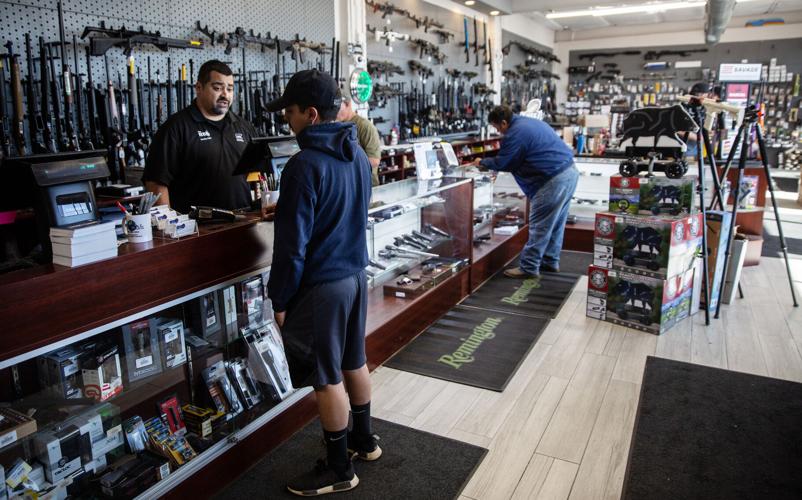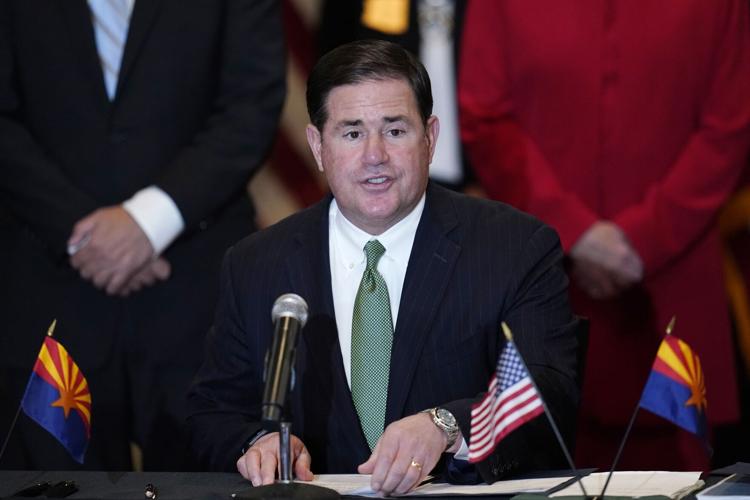PHOENIX — Gov. Doug Ducey signed legislation to declare gun shops “essential” and protect them, firearms manufacturers and trade associations like the National Rifle Association from being sued by those who are killed or injured by their products.
Ducey, in his 2020 declaration of the pandemic emergency, had already specifically declared that places where guns and ammo are sold are essential and exempt from any closure requirements due to COVID-19.
His signature Friday on the new law also came despite the fact that the federal Protection of Lawful Commerce in Arms Act, approved by Congress in 2005, already shields manufacturers and dealers from being held liable when crimes are committed with their products.
But Rep. Quang Nguyen, R-Prescott Valley, pointed out that President Joe Biden, asked what would be his top priority in his agenda to deal with gun violence, said it would be to repeal the law. Nguyen said he wanted something in place in Arizona should that happen.
The Republican governor, in inking his approval to the measure, echoed that theme.
“With efforts currently underway in Washington to erode Second Amendment rights, Arizona is taking action to protect those rights,” Ducey said in a prepared statement.
“Bad actors need to be held accountable, and we will work to make sure they are,” said Ducey, though he cited no examples of what he is doing in that area.
The governor’s press aide C.J. Karamargin said Ducey believes the law still allows “legitimate’’ lawsuits against gun manufacturers and sellers. But he could not cite a specific instance of what kinds of litigation could proceed.
After stiff opposition from gun-rights groups, Ducey abandoned the one gun violence bill he proposed years ago: To allow judges to issue a Severe Threat Order of Protection, known as a STOP. Those orders would have required people who own firearms to submit to mental evaluations and to have police take their guns pending such examinations.
“But we are not going to allow lawsuit after lawsuit to slowly tear down the constitutional rights of law-abiding citizens in hour state,” Ducey said in his statement.
Rep. Diego Rodriguez, D-Phoenix, chided Republican colleagues for approving the measure, which has no immediate effect, rather than dealing with the underlying issues of gun violence.
The Legislature is dealing with “these bogeyman stories of people coming into your homes, trying to take your guns,” Rodriguez said. “No one is advocating that. What we would like to see is a heartfelt, meaningful, substantive discussion of the issue of gun violence in this country.’’
Rep. Jennifer Longdon, D-Phoenix, had her own perspective on what she said has been the failure of state lawmakers to address gun violence.
“The reason I am sitting here explaining my vote is unfettered access to firearms,” she told colleagues. Longdon uses a wheelchair, having been paralyzed in a 2004 incident where an unknown gunman fired at her and her financé, who was left blind and with brain damage.
“I, too, support the Second Amendment,” Longdon said. She brushed aside concerns that Arizonans were in danger of losing their access to guns.
“Last year, gun sales in Arizona during this pandemic rose by 101%,” she said. “No one was denied lawful access to purchase a firearm. So why bother” passing new laws like this, she asked.
“We bother because we have an administration that’s made it clear they want to infringe on our Second Amendment,” responded Rep. Leo Biasiucci, R-Lake Havasu City.
“You have a threat from the administration in D.C. that says, ‘We’re going to sue gun manufacturers for a mass shooting,’ which makes absolutely zero sense,” he said. “It’s the person behind the gun, it’s the person behind the knife, it’s the person behind the fist that causes the shooting, the stabbing, the assault.”
Nguyen said “part of my job as a representative is to protect business and jobs,” not only in his district but in the entire state. “And I believe this bill will do just that.”
He said he has a particular perspective on the right to bear arms, having been born in Vietnam in 1962 and emigrating to the United States after the war.
“I know what it’s like to live in a country with no Second Amendment,” he said. “I’ve seen people killed, I’ve seen people die without the ability to defend themselves.”
Rep. Daniel Hernandez, D-Tucson, said he saw no reason to carve out a special exemption from liability for the gun industry.
Hernandez has been a supporter of stronger laws on gun access since he was at the 2011 mass shooting of Congresswoman Gabrielle Giffords and others. He was a congressional intern who helped organize the “Congress on Your Corner’’ event in Tucson where the shooting occurred, and he helped to staunch the flow of blood from Giffords’ head.
Nguyen said the liability exemption isn’t unique.
He cited the 1986 National Childhood Vaccine Injury Act, which provides immunity to manufacturers for their products. That law, however, also sets up a system of compensation for those found to be injured by a certain vaccine.
Nguyen also pointed to the General Aviation Revitalization Act, a 1994 federal law that shields the manufacturers of aircraft and their component parts from liability from lawsuits. But, here, too, it is not blanket immunity but only against lawsuits filed more than 18 years after the aircraft or part was first manufactured.
The new Arizona law prohibits such lawsuits from being filed over guns, and also requires a court, if it tosses the claim based on the law, to assess legal fees and costs against the person who filed it.
It does contain exceptions.
For example, lawsuits alleging breach of warranty would remain legal. So would those in cases of death, physical injury or property damage “resulting directly from a defect in the design or manufacture of the qualified product” if it is being used as intended.





